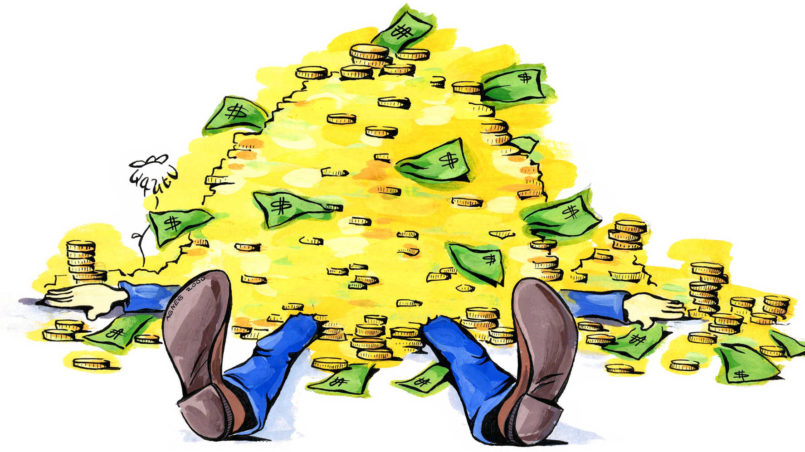The Unconditional Basic Income: Future Vision or Social Utopia?

For some years now, unconditional basic income (hereafter UBI) has been the subject of public debate. It is intended to offer all people a life that is free of financial worries and thus radically changes society. But is that realistic?
The idea of the UBI is that every month everyone receives an amount from the public sector that offers them a material means of securing their livelihood. In contrast to previous social benefits, the UBI should be paid out to everyone in the same amount and should not be subject to the condition of any kind of neediness, such as unemployment or incapacity for work – in other words,”unconditionally”.
The second major difference to previous social benefits: the UBI would be paid out (according to its basic idea) in addition to the labour income and independent of existing assets. So it would not only be available to those in need, but to everyone. It would not be necessary to apply to any office and answer questions about most private matters, nor would there be any obligation to provide further training and no need to be “available for the labour market” at all times.
The pressure of not having to work any longer would take away such a heavy burden from us that we could all live in a much more relaxed way and deal with each other in a completely new manner. A whole new society full of optimism, creativity and new ideals and ideas would emerge, the hope of the supporters.
Money for everyone, just like that. When I first heard about it a few years ago, I thought:“Sounds great. But how is that possible?” Questions arise about how:
Where will the money come from? And who will want to work if you get enough money anyway?
Well, the UBI should not be more than a basic safeguard (nearly all proponents agree on that): everyone should get so much that they can lead a halfway decent life. Luxury is therefore not foreseen; if you want to afford it, you must continue to pursue paid work. However, if you have modest material needs, you could also do without an additional income and pursue activities that are worthwhile in a different way than through payment – such as social or artistic work. And of course, the UBI would also give you the opportunity to just lay down on your lazy skin and watch TV all day long.
What would happen if no-one had to work? Would a sufficient number of people still be willing to continue to pursue the usual working conditions, because this is an important part of their purpose in life or because they appreciate the financial freedom of the double income from the UBI and a salary? Or would it lead to a society in which all of them either no longer work at all or only pursue hobbies that mean a lot to the person concerned but do not really benefit everyone else? Would we become a society of orchid growers and permanent tourists?
One of the best-known protagonists of the UBI is Götz W. Werner, the founder and current head of the German drugstore chain dm. The fact that it was a very successful large-scale entrepreneur who proclaimed an idea that at first glance appears to be a socially romantic dream of left-wing extremists was surprising and attracted a great deal of attention. In his first book “Einkommen für alle” (“Income for All”), which was published in 2008, Werner first outlines the starting point:”In recent decades, it has been shown that economic growth is less and less associated with an increase in jobs due to increasing automation”. “Jobless growth” is the term given to the fact that today we are able to produce more and more goods with less and less human labour.
However, this does not only apply to activities in the production area; recently, services can also be provided by increasing automation of fewer and fewer people in constant quality. For example, self-driving cars will presumably soon make taxi and truck drivers superfluous, and there are trials with 3D printers that can build houses and replace construction workers. With the increasing development of artificial intelligence, it is possible that an increasing number of highly qualified human resources such as journalists, lawyers and even doctors (certainly not all but to a significant extent) could be replaced by intelligent machines in the future. Productive work will certainly not increase in the future.
However, the protagonists of the UBI see the increasing replacement of human labour with machines and computers not as a threat, but as an opportunity – for the far-reaching liberation of people from frustrating and non-fulfilling work. “Man only does work that makes sense and is fun. Stupid and undignified work is done by the robot,” says Thomas Straubhaar, professor of economics in Hamburg, in his book “Radikal gerecht” (“Radically fair”) of 2017 (page 20).
Götz W. Werner is also in favour of a radical rethink: we must move away from the idea that all adults who could work must actually do so. We must stop seeing paid work (or self-employment) as the real meaning of life and the only source of income. Above all, we must stop seeing unemployment as a flaw that needs to be remedied as soon as possible. With a UBI, people would become more self-confident, creative, courageous and thus ultimately more productive:“Those who are certain that failure does not lead to a bottomless fall in need and poverty will dare to do more,” Thomas Straubhaar writes.
There is, therefore, no question that the unconditional basic income would make sense. But how is that possible? This is the question I will be pursuing in the next part of this series.
Translation German-English: Anna Dichen
Credits
| Image | Title | Author | License |
|---|---|---|---|
 |
basic income | Agnes Avagyan | CC BY-SA 4.0 |
